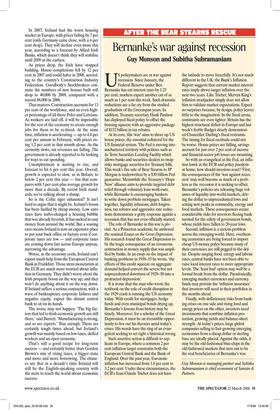Bernanke’s war against recession
Guy Monson and Subitha Subramaniam
US policymakers are at war against recession. Since January, the Federal Reserve under Ben Bernanke has cut interest rates by 1.25 per cent; markets expect another cut of as much as 1 per cent this week. Such dramatic reductions are a far cry from the studied gradualism of the Greenspan years. In addition, Treasury secretary Hank Paulson has deployed fiscal policy to offset the housing squeeze with an aggressive package of $152 billion in tax rebates.
At its core, this ‘war’ aims to shore up US house prices, the essential collateral for the US financial system. The Fed is moving into unchartered territory with policies such as its Term Securities Lending Facility which allows banks and securities dealers to swap risky mortgage securities for Treasury bills. This week’s fire sale of Bear Stearns to JP Morgan is underwritten by a $30 billion Fed guarantee. Meanwhile the Treasury’s ‘Hope Now’ alliance aims to provide targeted debt relief through voluntary loan work-outs, while Bernanke is encouraging bankers to write down problem mortgages. Taken together, liquidity infusions, debt forgiveness, tax rebates and aggressive rate reductions demonstrate a gritty response against a recession that has not even officially started.
The role of Bernanke in this war is pivotal. As a Princeton academic, he authored the seminal Essays on the Great Depression. His research found the Great Depression to be the tragic consequence of an erroneous contraction in money supply that was amplified by banks. In an essay on the impact of banking problems in 1930–33 he wrote, ‘the effects of this credit squeeze on aggregate demand helped convert the severe but not unprecedented downturn of 1929–30 into a protracted depression’.
It is ironic that the man who wrote the textbook on the role of credit disruption in the 1929 crash is running the US economy today. With credit for mortgages, hedge funds and even municipal bonds drying up, Bernanke’s lessons from history may be timely. Moreover, for a scholar of the Great Depression, it must be an irresistible opportunity to live out his theories amid today’s crises. His words have the ring of an evangelical seeking to set right a historical wrong.
Such assertive action is difficult to replicate in Europe, where a common 2 per cent inflation target constrains both the European Central Bank and the Bank of England. Over the past year, Eurozone inflation has increased from 1.8 per cent to 3.2 per cent. Under these circumstances, the ECB’s Jean-Claude Trichet does not have the latitude to move forcefully. It’s not much different in the UK: the Bank’s Inflation Report suggests that current market interest rates imply above-target inflation over the next two years. Like Trichet, Mervyn King’s inflation straitjacket simply does not allow him to validate market expectations. Expect no surprises because, by design, policy leaves little to the imagination. In the fiscal arena, constraints are even tighter. Britain has the highest structural deficit in Europe and last week’s feeble Budget clearly demonstrated Chancellor Darling’s fiscal restraints. The timing for fiscal rectitude could not be worse. House prices are falling, savings account for just over 2 per cent of income and financial-sector job losses are mounting.
So with an evangelical at the Fed, an inflation hawk at the ECB and policy paralysis at home, how should investors react? First, the consequences of the ‘war against recession’ may well become as much of a problem as the recession it is seeking to offset. Bernanke’s policies are releasing huge volumes of liquidity into world markets, driving the dollar to unprecedented lows and setting new peaks in commodity, energy and food markets. These consequences create considerable risks for investors fleeing bank turmoil for the safety of government bonds, whose yields have fallen to 20-year lows.
Second, inflation is a serious problem across the emerging world. Here, overheating economies are being forced to import cheap US money policy because many of their currencies are still pegged to the dollar. Despite surging food, energy and labour rates, central banks have not been able to raise local interest rates to more appropriate levels. The ‘least bad’ option may well be a formal break from the dollar. Paradoxically, emerging market currencies and currency funds may provide the ‘inflation insurance’ that investors will need in their portfolios in the months ahead.
Finally, with deflationary risks from banking crises on one side and rising food and energy prices on the other, investors need investments that combine inflation protection, growing yields and balance-sheet strength. At today’s prices, large global companies selling to fast-growing emerging economies from a cheap dollar or sterling base are ideally placed. Against the odds, it may be the old-fashioned blue-chips in the old-fashioned markets that turn out to be the real beneficiaries of Bernanke’s war.


















































































 Previous page
Previous page